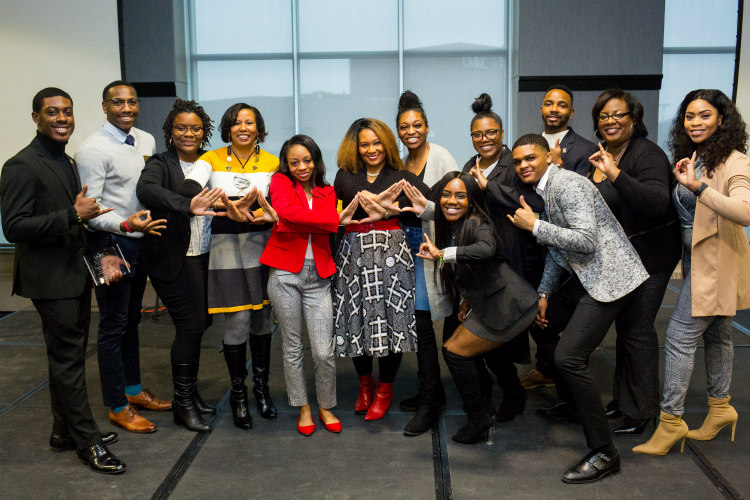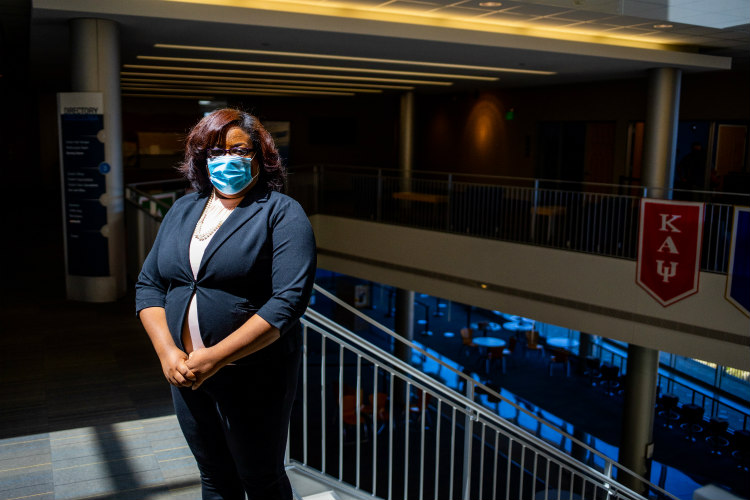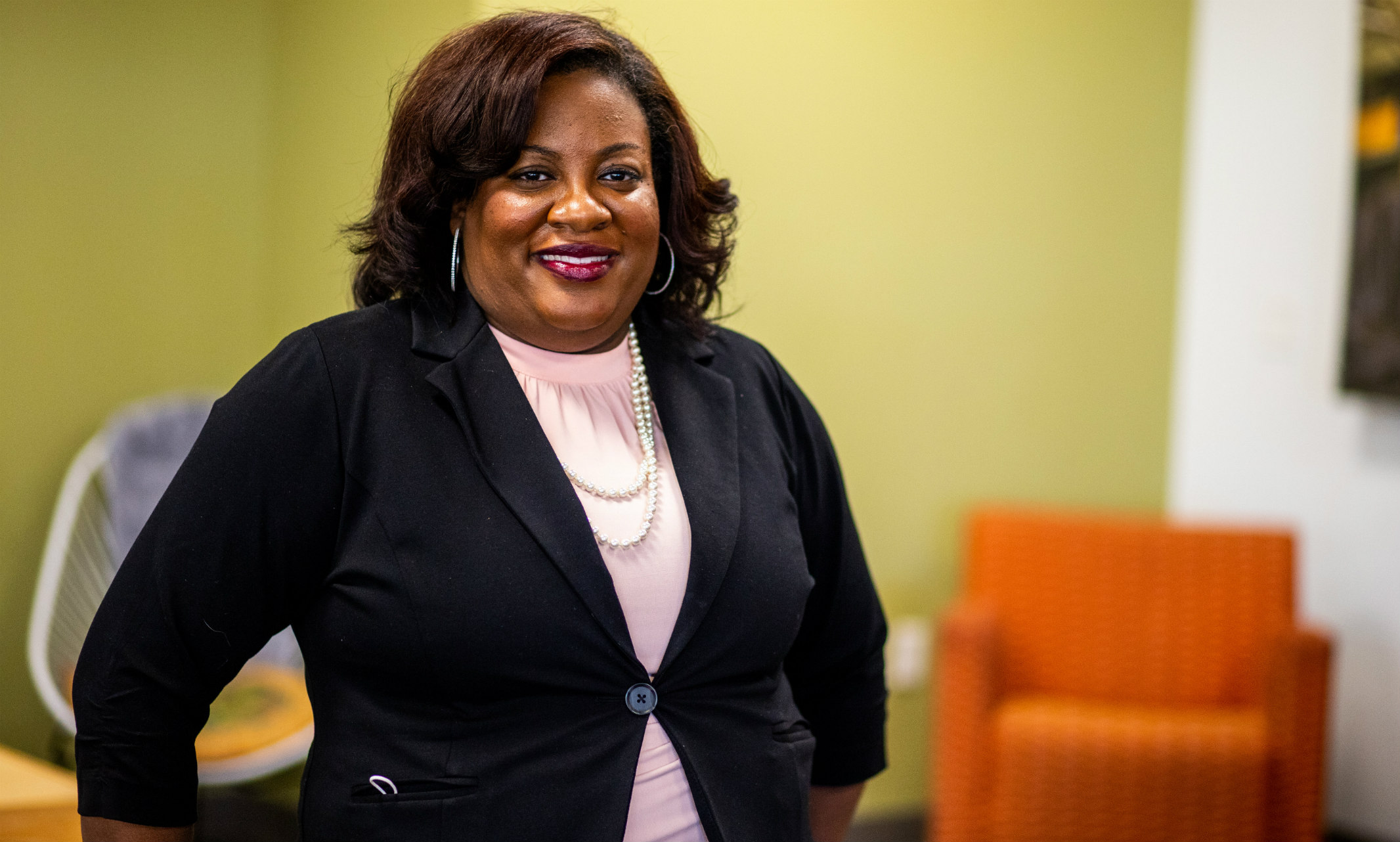The Black Excellence at UMKC series helps to increase awareness of the representation of Black faculty and staff and show a visible commitment to diversity, equity and inclusion on campus. This series highlights Black and Roo faculty and staff working to help our university achieve its mission to promote learning and discovery for all people at UMKC and the greater Kansas City community.
Name: Keichanda Dees-Burnett
Job function: co-interim dean of students and director of Multicultural Student Affairs
Tenure: 17 years
Hometown: Kansas City, Missouri
Alma Mater and Degree Program: UMKC
B.A. Communication Studies (minor in Black studies) '02;
M.A. Higher Education Administration '04;
Current Ed.D student
Keichanda Dees-Burnett grew up at UMKC. From an active undergraduate majoring in communications studies to the director of Multicultural Student Affairs and co-interim dean of students, the Kansas City native is a key source of support for minority students on campus. Oft-referred to by many students of color as a go-to safe space on campus, Dees-Burnett said one the best parts of her job is the opportunity to mentor and interact with them daily while helping them achieve their goals.
"It is my responsibility to help them make connections with other faculty, staff and community members who can help them reach their goals."
Why did you choose UMKC as the place to grow your career?
It happened naturally. I didn’t necessarily know I would grow my career here, but I definitely chose to start here. I enjoyed my experience as an undergraduate student here at UMKC and wanted the opportunity to give back to future students and make their experience even better.
What do you enjoy most about working at UMKC?
I enjoy working with the students and doing my part to help make this campus welcoming and exciting for them. I also enjoy my wonderful colleagues across campus. Everyone is always great about lending their expertise with initiatives that support students.
"There’s a need to help others understand what it is that we do and the importance of our work in achieving the mission of the university."
How did you decide this career was right for you?
I knew this career was for me after my first semester in graduate school. I was very involved at UMKC as an undergraduate. I was active with the Office of Multicultural Student Affairs, The African American Student Union, Student Government Association and the Rho Alpha Chapter of Alpha Kappa Alpha Sorority, Inc.
When I started learning about student development theories and the history of higher education and the college environment, it enhanced my understanding of how the university and its staff support students. That’s what influenced me to take what I learned and put it into practice.

What are the challenges of your career field?
Increased cuts in funding to higher education definitely threaten our ability to create and maintain important programs and services that support student engagement and success on campus. Also, higher education administration or student affairs aren’t careers commonly known to those outside of the field. There’s a need to help others understand what it is that we do and the importance of our work in achieving the mission of the university.
What are the benefits of your career field?
Helping students get to college and helping them reach their aspirational goal of graduating from college. We also have the privilege of observing and influencing the growth and development of students from the beginning to the end of their college journey. For many student affairs professionals, our connections with our students last beyond graduation, sometimes even for life.
How do you connect and establish relationships with other Black faculty and staff in other units and departments?
I am hopeful that there are things in the works to make it easier for Black staff and faculty to connect. I typically meet other Black staff or faculty through committee work on campus, or participation on panel discussions. The Women of Color Leadership Conference planning committee has served as a great source for meeting fellow Black women staff and faculty. I typically try to maintain those relationships through periodic email check-ins, connecting on social media or connecting them to opportunities to get involved with MSA.
Describe your mentoring relationships with students.
My role as a mentor is to empower students to make decisions that are best for them by sharing my knowledge, providing honest feedback, offering pros and cons and, ultimately, respecting the fact they are adults. It is my responsibility to help them make connections with other faculty, staff and community members who can help them reach their goals.

What is one word that best describes you?
Selfless. I very rarely do anything with myself in mind. This may be to a fault at times but doing what’s right for the greater good is what drives me.
What is your favorite spot to eat in Kansas City?
There are too many great places in KC to choose from, but I will say Jazz’s Louisiana Kitchen because I LOVE Cajun and spicy foods. Peachtree Buffet is also one of my favorites.
Where’s your favorite spot to hang out/visit in Kansas City?
My aunt and uncle’s front porch on a Saturday night.
"For many student affairs professionals, our connections with our students last beyond graduation, sometimes even for life."
What’s your favorite spot on campus?
The Student Union, specifically the Office of Multicultural Student Affairs, which is where my office is located. I love all the noise and energy from the students in the building and the opportunity to interact with them daily. Being around students everyday has definitely kept me youthful.
What is one piece of advice you’d give someone looking to grow their career at UMKC?
I would advise new employees to take some time to understand the culture of UMKC, lean on their colleagues with tenure for support, and to never be afraid to ask questions.
What is one piece of advice you’d give a student wanting to follow in your footsteps?
Start protecting your image and reputation now, and nurture existing relationships because you NEVER know who you will need later when you get into the field.

